

SUBSCRIBE TO OUR FREE NEWSLETTER
Daily news & progressive opinion—funded by the people, not the corporations—delivered straight to your inbox.
5
#000000
#FFFFFF
To donate by check, phone, or other method, see our More Ways to Give page.


Daily news & progressive opinion—funded by the people, not the corporations—delivered straight to your inbox.

Protest against the Russian invasion of Ukraine at North Beach on March 06, 2022 in Durban, South Africa. Protests have erupted around the world, with thousands of people taking to the streets in support of Ukraine.
This won't be easy. This won't be fun. But it must be done.
The following is based on the prepared remarks for a speech that will be given at the Peace in Ukraine rally in Bostson, Massachusetts on Saturday, September 30, 2023.
This week marks the Days of International Action for a Ukraine ceasefire and negotiations called in last June’s International Peace Summit in Vienna. The killing must stop, and potentially far worse geographical or vertical escalation must be prevented.
Recently Dr. Alexey Gromyko, the grandson of the longtime Soviet foreign minister and significant figure in the Russian establishment, addressed a German webinar. Two essential points stood out in his presentation.
First, this is the most dangerous moment in world history since 1962, when the U.S. and the Soviet Union went eyeball to eyeball during the Cuban Missile Crisis. Back then the Kennedy administration believed the chances of an apocalyptic U.S.-Soviet nuclear war were between one-third and fifty percent. It was also the occasion for a series of miscalculations. Unknown to most then and now is that we were brought to the brink of annihilation when a mistaken nuclear launch order was sent to a U.S. missile base in Okinawa and when a nuclear-armed Soviet submarine was attacked by depth charges in violation of Kennedy’s orders. We were saved by a courageous Russian submarine officer who opted to lose rather than use his nuclear-tipped torpedoes and by a U.S. missileer who chose to ignore the mistaken Okinawan launch order. Those decisions, luck, and inspired diplomacy which we lack today explain why we are still alive.
And again, today we are confronted by arrogant great power confrontations and the danger of nuclear annihilation.
Dr. Gromyko’s other point, which we needn’t love but must respect, helps to explain the urgency of today’s crisis. Victory in the Ukraine War is, he said, a “key national security interest of Russia,” and “no nuclear power can accept losing a military conflict.” Fortunately, at this stage in the war, unlike February 24, 2022, “victory” may consist of an armistice that leaves Moscow in control of Crimea and the devastated districts of Donetsk and Luhansk which it now occupies rather than the total defeat and functional elimination of the Ukrainian state.
The greatest danger we face would be if Kyiv threatened Moscow’s hold of Crimea, home to Moscow’s Black Sea fleet for almost three centuries. As one Russian general said in a Track II exchange, if Crimea is threatened “All bets are off” in terms of Russia resorting to its nuclear arsenal. The annexation of Crimea in 2014 violated the U.N. charter, but it was consistent with Russian history, with the current Russian empire’s perceived vital interests, and with popular support of the Russian-identified majority there.
Sixty years ago, President Kennedy was prophetic when he advised that “while defending our own vital interests, nuclear powers must avert those confrontations which bring an adversary to a choice of either a humiliating retreat or a nuclear war. To adopt that kind of course in the nuclear age would be evidence only of the bankruptcy of our policy--or of a collective death-wish for the world.”
Regardless of rights and wrongs, NATO’s reckless expansion to Russia’s borders, the EU’s insistence that Kyiv sever all economic ties with Moscow to join the Economic Union, and Putin’s brutal preemptive and imperial invasion of Ukraine, the reality is that time is NOT on Ukraine’s side. And, as Tom Friedman wrote in the New York Times in the early days of the war, like it or not the war can only end with a “dirty deal.” Better now than later.
Which brings us to June’s International Peace Summit in Vienna and the urgent need for a ceasefire and negotiations.
We were more than 300 people from 32 countries, primarily from Europe, but also from the Global South and several from the United States. We were blessed with the courageous presence of Russian and Ukrainian peace advocates, at least one of whom is currently under house arrest for opposing the war. We certainly had our differences. Not least were those between the Italian labor and religious leaders who have organized the largest peace rallies to date, who played a major role in organizing the Vienna Peace Summit, and who wanted to limit demands to ceasefire and negotiations on one side. On the other side were the U.S. Peace In Ukraine Coalition representative and others who initially insisted that the Summit’s call include condemnation of NATO imperialism and rejection of all arms transfers to Ukraine.
There was easy unity in condemning Russia’s invasion. And in the course respectful conversation fueled by the desperate appeal from Ukrainian and other delegates to stop the devastation and prevent escalation, and by the need for movement unity, conference organizers unified around our call for ceasefire, negotiations, and this week’s days of international actions.
Two striking memories persist. First was the shock of learning that pressure from the Ukrainian government on the Austrian labor union that hosted the summit had led to the cancellation of the conference site two days before we foreign delegates descended on Vienna. Kyiv wanted to prevent the peace summit from happening. So much for Ukraine’s commitment to democracy! An alternate was found.
Second was the excellent speech by the former U.S. colonel and diplomat Ann Wright. She cut through rhetoric and criticisms that a ceasefire will leave Russian aggression in place, reminding those assembled that it took more than 500 meetings over the better part of two years to achieve the now 70-year-old, if still fragile, Korean Armistice. In that light, she stressed the urgent need for negotiations to begin progress toward a ceasefire now!
Before the war began, my hope was that diplomacy would prevent war and result in a neutral, non-NATO Ukraine, whose sovereignty, including the right to join the E.U., would be credibly guaranteed, perhaps by the United Nations. That was discussed in Track II diplomatic sessions, and it is still my hope.
I also believe that it is in Ukraine’s interest to discard its ten-point “peace” demands. Crimea will not be returned to Ukraine in our lifetimes, if ever. That is simply a fact of life. This war is stalemated, and the sacrifice of thousands of Ukrainian warriors’ lives to regain a few villages is a fool’s errand that also risks catastrophic military—including nuclear—and geographic escalation of the war.
General Milley was correct when he warned that neither side can win this war militarily. Now, with its infinitely smaller economic and military production capacity, its much smaller population compounded by millions of its people displaced across Europe, many of whom will never return to Ukraine, and with diminishing international support for a costly and endless war, it is in Ukraine’s national interest as well as ours to press for a ceasefire and negotiations.
President Zelensky does face threats to his rule, and maybe even his life, if he reduces his demands. This underscores the need for President Biden to stop allowing the Ukrainian tail to wag the American dog. Biden should give Zelinsky cover by insisting on negotiations and a ceasefire. Bidden should be declaring that it’s time for multi-layered and integrated negotiations: Ukrainian-Russian, Russian-NATO, and U.S.-Russia.
This won’t be easy. The Minsk accords and still secret Istanbul text are dead letters. Wars speed history and Russia’s invasion of Ukraine has crystalized the post-Cold War emergence of a new multipolar disorder. Fiona Hill put it well when she said that Pax Americana is over. The U.S. is no longer able to almost unilaterally dictate the contours of the European order. It is in our interest, Ukraine’s, and the world’s for the U.S. to insist on a ceasefire, to move to negotiations, and to adjust U.S. policies to the new multipolar reality.Trump and Musk are on an unconstitutional rampage, aiming for virtually every corner of the federal government. These two right-wing billionaires are targeting nurses, scientists, teachers, daycare providers, judges, veterans, air traffic controllers, and nuclear safety inspectors. No one is safe. The food stamps program, Social Security, Medicare, and Medicaid are next. It’s an unprecedented disaster and a five-alarm fire, but there will be a reckoning. The people did not vote for this. The American people do not want this dystopian hellscape that hides behind claims of “efficiency.” Still, in reality, it is all a giveaway to corporate interests and the libertarian dreams of far-right oligarchs like Musk. Common Dreams is playing a vital role by reporting day and night on this orgy of corruption and greed, as well as what everyday people can do to organize and fight back. As a people-powered nonprofit news outlet, we cover issues the corporate media never will, but we can only continue with our readers’ support. |
The following is based on the prepared remarks for a speech that will be given at the Peace in Ukraine rally in Bostson, Massachusetts on Saturday, September 30, 2023.
This week marks the Days of International Action for a Ukraine ceasefire and negotiations called in last June’s International Peace Summit in Vienna. The killing must stop, and potentially far worse geographical or vertical escalation must be prevented.
Recently Dr. Alexey Gromyko, the grandson of the longtime Soviet foreign minister and significant figure in the Russian establishment, addressed a German webinar. Two essential points stood out in his presentation.
First, this is the most dangerous moment in world history since 1962, when the U.S. and the Soviet Union went eyeball to eyeball during the Cuban Missile Crisis. Back then the Kennedy administration believed the chances of an apocalyptic U.S.-Soviet nuclear war were between one-third and fifty percent. It was also the occasion for a series of miscalculations. Unknown to most then and now is that we were brought to the brink of annihilation when a mistaken nuclear launch order was sent to a U.S. missile base in Okinawa and when a nuclear-armed Soviet submarine was attacked by depth charges in violation of Kennedy’s orders. We were saved by a courageous Russian submarine officer who opted to lose rather than use his nuclear-tipped torpedoes and by a U.S. missileer who chose to ignore the mistaken Okinawan launch order. Those decisions, luck, and inspired diplomacy which we lack today explain why we are still alive.
And again, today we are confronted by arrogant great power confrontations and the danger of nuclear annihilation.
Dr. Gromyko’s other point, which we needn’t love but must respect, helps to explain the urgency of today’s crisis. Victory in the Ukraine War is, he said, a “key national security interest of Russia,” and “no nuclear power can accept losing a military conflict.” Fortunately, at this stage in the war, unlike February 24, 2022, “victory” may consist of an armistice that leaves Moscow in control of Crimea and the devastated districts of Donetsk and Luhansk which it now occupies rather than the total defeat and functional elimination of the Ukrainian state.
The greatest danger we face would be if Kyiv threatened Moscow’s hold of Crimea, home to Moscow’s Black Sea fleet for almost three centuries. As one Russian general said in a Track II exchange, if Crimea is threatened “All bets are off” in terms of Russia resorting to its nuclear arsenal. The annexation of Crimea in 2014 violated the U.N. charter, but it was consistent with Russian history, with the current Russian empire’s perceived vital interests, and with popular support of the Russian-identified majority there.
Sixty years ago, President Kennedy was prophetic when he advised that “while defending our own vital interests, nuclear powers must avert those confrontations which bring an adversary to a choice of either a humiliating retreat or a nuclear war. To adopt that kind of course in the nuclear age would be evidence only of the bankruptcy of our policy--or of a collective death-wish for the world.”
Regardless of rights and wrongs, NATO’s reckless expansion to Russia’s borders, the EU’s insistence that Kyiv sever all economic ties with Moscow to join the Economic Union, and Putin’s brutal preemptive and imperial invasion of Ukraine, the reality is that time is NOT on Ukraine’s side. And, as Tom Friedman wrote in the New York Times in the early days of the war, like it or not the war can only end with a “dirty deal.” Better now than later.
Which brings us to June’s International Peace Summit in Vienna and the urgent need for a ceasefire and negotiations.
We were more than 300 people from 32 countries, primarily from Europe, but also from the Global South and several from the United States. We were blessed with the courageous presence of Russian and Ukrainian peace advocates, at least one of whom is currently under house arrest for opposing the war. We certainly had our differences. Not least were those between the Italian labor and religious leaders who have organized the largest peace rallies to date, who played a major role in organizing the Vienna Peace Summit, and who wanted to limit demands to ceasefire and negotiations on one side. On the other side were the U.S. Peace In Ukraine Coalition representative and others who initially insisted that the Summit’s call include condemnation of NATO imperialism and rejection of all arms transfers to Ukraine.
There was easy unity in condemning Russia’s invasion. And in the course respectful conversation fueled by the desperate appeal from Ukrainian and other delegates to stop the devastation and prevent escalation, and by the need for movement unity, conference organizers unified around our call for ceasefire, negotiations, and this week’s days of international actions.
Two striking memories persist. First was the shock of learning that pressure from the Ukrainian government on the Austrian labor union that hosted the summit had led to the cancellation of the conference site two days before we foreign delegates descended on Vienna. Kyiv wanted to prevent the peace summit from happening. So much for Ukraine’s commitment to democracy! An alternate was found.
Second was the excellent speech by the former U.S. colonel and diplomat Ann Wright. She cut through rhetoric and criticisms that a ceasefire will leave Russian aggression in place, reminding those assembled that it took more than 500 meetings over the better part of two years to achieve the now 70-year-old, if still fragile, Korean Armistice. In that light, she stressed the urgent need for negotiations to begin progress toward a ceasefire now!
Before the war began, my hope was that diplomacy would prevent war and result in a neutral, non-NATO Ukraine, whose sovereignty, including the right to join the E.U., would be credibly guaranteed, perhaps by the United Nations. That was discussed in Track II diplomatic sessions, and it is still my hope.
I also believe that it is in Ukraine’s interest to discard its ten-point “peace” demands. Crimea will not be returned to Ukraine in our lifetimes, if ever. That is simply a fact of life. This war is stalemated, and the sacrifice of thousands of Ukrainian warriors’ lives to regain a few villages is a fool’s errand that also risks catastrophic military—including nuclear—and geographic escalation of the war.
General Milley was correct when he warned that neither side can win this war militarily. Now, with its infinitely smaller economic and military production capacity, its much smaller population compounded by millions of its people displaced across Europe, many of whom will never return to Ukraine, and with diminishing international support for a costly and endless war, it is in Ukraine’s national interest as well as ours to press for a ceasefire and negotiations.
President Zelensky does face threats to his rule, and maybe even his life, if he reduces his demands. This underscores the need for President Biden to stop allowing the Ukrainian tail to wag the American dog. Biden should give Zelinsky cover by insisting on negotiations and a ceasefire. Bidden should be declaring that it’s time for multi-layered and integrated negotiations: Ukrainian-Russian, Russian-NATO, and U.S.-Russia.
This won’t be easy. The Minsk accords and still secret Istanbul text are dead letters. Wars speed history and Russia’s invasion of Ukraine has crystalized the post-Cold War emergence of a new multipolar disorder. Fiona Hill put it well when she said that Pax Americana is over. The U.S. is no longer able to almost unilaterally dictate the contours of the European order. It is in our interest, Ukraine’s, and the world’s for the U.S. to insist on a ceasefire, to move to negotiations, and to adjust U.S. policies to the new multipolar reality.The following is based on the prepared remarks for a speech that will be given at the Peace in Ukraine rally in Bostson, Massachusetts on Saturday, September 30, 2023.
This week marks the Days of International Action for a Ukraine ceasefire and negotiations called in last June’s International Peace Summit in Vienna. The killing must stop, and potentially far worse geographical or vertical escalation must be prevented.
Recently Dr. Alexey Gromyko, the grandson of the longtime Soviet foreign minister and significant figure in the Russian establishment, addressed a German webinar. Two essential points stood out in his presentation.
First, this is the most dangerous moment in world history since 1962, when the U.S. and the Soviet Union went eyeball to eyeball during the Cuban Missile Crisis. Back then the Kennedy administration believed the chances of an apocalyptic U.S.-Soviet nuclear war were between one-third and fifty percent. It was also the occasion for a series of miscalculations. Unknown to most then and now is that we were brought to the brink of annihilation when a mistaken nuclear launch order was sent to a U.S. missile base in Okinawa and when a nuclear-armed Soviet submarine was attacked by depth charges in violation of Kennedy’s orders. We were saved by a courageous Russian submarine officer who opted to lose rather than use his nuclear-tipped torpedoes and by a U.S. missileer who chose to ignore the mistaken Okinawan launch order. Those decisions, luck, and inspired diplomacy which we lack today explain why we are still alive.
And again, today we are confronted by arrogant great power confrontations and the danger of nuclear annihilation.
Dr. Gromyko’s other point, which we needn’t love but must respect, helps to explain the urgency of today’s crisis. Victory in the Ukraine War is, he said, a “key national security interest of Russia,” and “no nuclear power can accept losing a military conflict.” Fortunately, at this stage in the war, unlike February 24, 2022, “victory” may consist of an armistice that leaves Moscow in control of Crimea and the devastated districts of Donetsk and Luhansk which it now occupies rather than the total defeat and functional elimination of the Ukrainian state.
The greatest danger we face would be if Kyiv threatened Moscow’s hold of Crimea, home to Moscow’s Black Sea fleet for almost three centuries. As one Russian general said in a Track II exchange, if Crimea is threatened “All bets are off” in terms of Russia resorting to its nuclear arsenal. The annexation of Crimea in 2014 violated the U.N. charter, but it was consistent with Russian history, with the current Russian empire’s perceived vital interests, and with popular support of the Russian-identified majority there.
Sixty years ago, President Kennedy was prophetic when he advised that “while defending our own vital interests, nuclear powers must avert those confrontations which bring an adversary to a choice of either a humiliating retreat or a nuclear war. To adopt that kind of course in the nuclear age would be evidence only of the bankruptcy of our policy--or of a collective death-wish for the world.”
Regardless of rights and wrongs, NATO’s reckless expansion to Russia’s borders, the EU’s insistence that Kyiv sever all economic ties with Moscow to join the Economic Union, and Putin’s brutal preemptive and imperial invasion of Ukraine, the reality is that time is NOT on Ukraine’s side. And, as Tom Friedman wrote in the New York Times in the early days of the war, like it or not the war can only end with a “dirty deal.” Better now than later.
Which brings us to June’s International Peace Summit in Vienna and the urgent need for a ceasefire and negotiations.
We were more than 300 people from 32 countries, primarily from Europe, but also from the Global South and several from the United States. We were blessed with the courageous presence of Russian and Ukrainian peace advocates, at least one of whom is currently under house arrest for opposing the war. We certainly had our differences. Not least were those between the Italian labor and religious leaders who have organized the largest peace rallies to date, who played a major role in organizing the Vienna Peace Summit, and who wanted to limit demands to ceasefire and negotiations on one side. On the other side were the U.S. Peace In Ukraine Coalition representative and others who initially insisted that the Summit’s call include condemnation of NATO imperialism and rejection of all arms transfers to Ukraine.
There was easy unity in condemning Russia’s invasion. And in the course respectful conversation fueled by the desperate appeal from Ukrainian and other delegates to stop the devastation and prevent escalation, and by the need for movement unity, conference organizers unified around our call for ceasefire, negotiations, and this week’s days of international actions.
Two striking memories persist. First was the shock of learning that pressure from the Ukrainian government on the Austrian labor union that hosted the summit had led to the cancellation of the conference site two days before we foreign delegates descended on Vienna. Kyiv wanted to prevent the peace summit from happening. So much for Ukraine’s commitment to democracy! An alternate was found.
Second was the excellent speech by the former U.S. colonel and diplomat Ann Wright. She cut through rhetoric and criticisms that a ceasefire will leave Russian aggression in place, reminding those assembled that it took more than 500 meetings over the better part of two years to achieve the now 70-year-old, if still fragile, Korean Armistice. In that light, she stressed the urgent need for negotiations to begin progress toward a ceasefire now!
Before the war began, my hope was that diplomacy would prevent war and result in a neutral, non-NATO Ukraine, whose sovereignty, including the right to join the E.U., would be credibly guaranteed, perhaps by the United Nations. That was discussed in Track II diplomatic sessions, and it is still my hope.
I also believe that it is in Ukraine’s interest to discard its ten-point “peace” demands. Crimea will not be returned to Ukraine in our lifetimes, if ever. That is simply a fact of life. This war is stalemated, and the sacrifice of thousands of Ukrainian warriors’ lives to regain a few villages is a fool’s errand that also risks catastrophic military—including nuclear—and geographic escalation of the war.
General Milley was correct when he warned that neither side can win this war militarily. Now, with its infinitely smaller economic and military production capacity, its much smaller population compounded by millions of its people displaced across Europe, many of whom will never return to Ukraine, and with diminishing international support for a costly and endless war, it is in Ukraine’s national interest as well as ours to press for a ceasefire and negotiations.
President Zelensky does face threats to his rule, and maybe even his life, if he reduces his demands. This underscores the need for President Biden to stop allowing the Ukrainian tail to wag the American dog. Biden should give Zelinsky cover by insisting on negotiations and a ceasefire. Bidden should be declaring that it’s time for multi-layered and integrated negotiations: Ukrainian-Russian, Russian-NATO, and U.S.-Russia.
This won’t be easy. The Minsk accords and still secret Istanbul text are dead letters. Wars speed history and Russia’s invasion of Ukraine has crystalized the post-Cold War emergence of a new multipolar disorder. Fiona Hill put it well when she said that Pax Americana is over. The U.S. is no longer able to almost unilaterally dictate the contours of the European order. It is in our interest, Ukraine’s, and the world’s for the U.S. to insist on a ceasefire, to move to negotiations, and to adjust U.S. policies to the new multipolar reality."Thank you to the hundreds of thousands of Americans across the country who are standing up and speaking out for our voting rights, fundamental freedoms, and essential services like Social Security and Medicare."
In communities large and small across the United States on Saturday, hundreds of thousands of people collectively took to the streets to make their opposition to President Donald Trump heard.
The people who took part in the organized protests ranged from very young children to the elderly and their message was scrawled on signs of all sizes and colors—many of them angry, some of them funny, but all in line with the "Hands Off" message that brought them together.
"Thank you to the hundreds of thousands of Americans across the country who are standing up and speaking out for our voting rights, fundamental freedoms, and essential services like Social Security and Medicare," said the group Stand Up America as word of the turnout poured in from across the country.
A relatively small, but representative sample of photographs from various demonstrations that took place follows.
Demonstrators gather on Boston Common, cheering and chanting slogans, during the nationwide "Hands Off!" protest against US President Donald Trump and his advisor, Tesla CEO Elon Musk, in Boston, Massachusetts on April 5, 2025. (Photo by Joseph Prezioso / AFP)
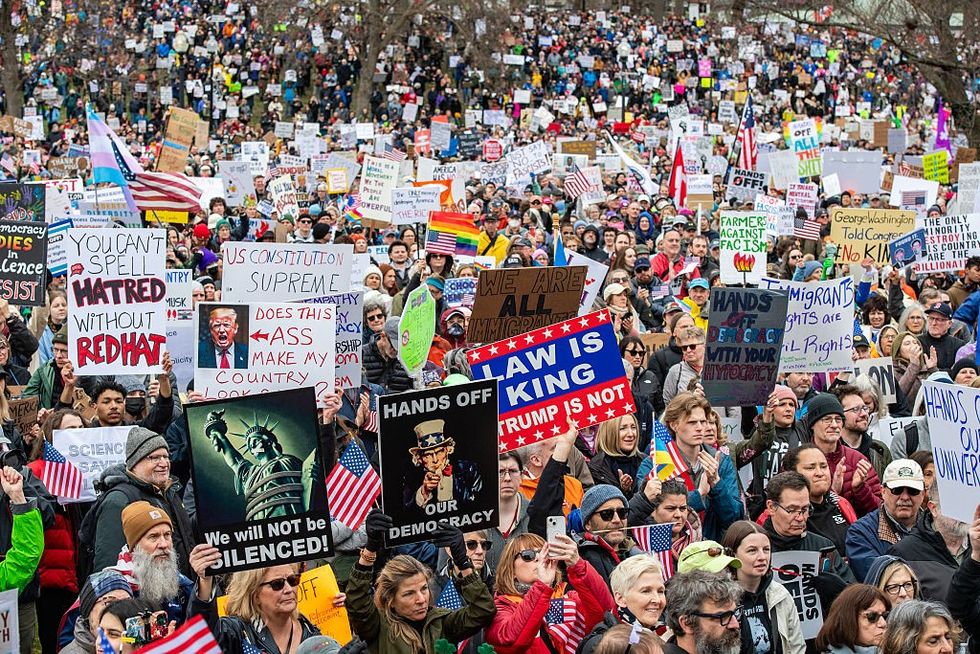
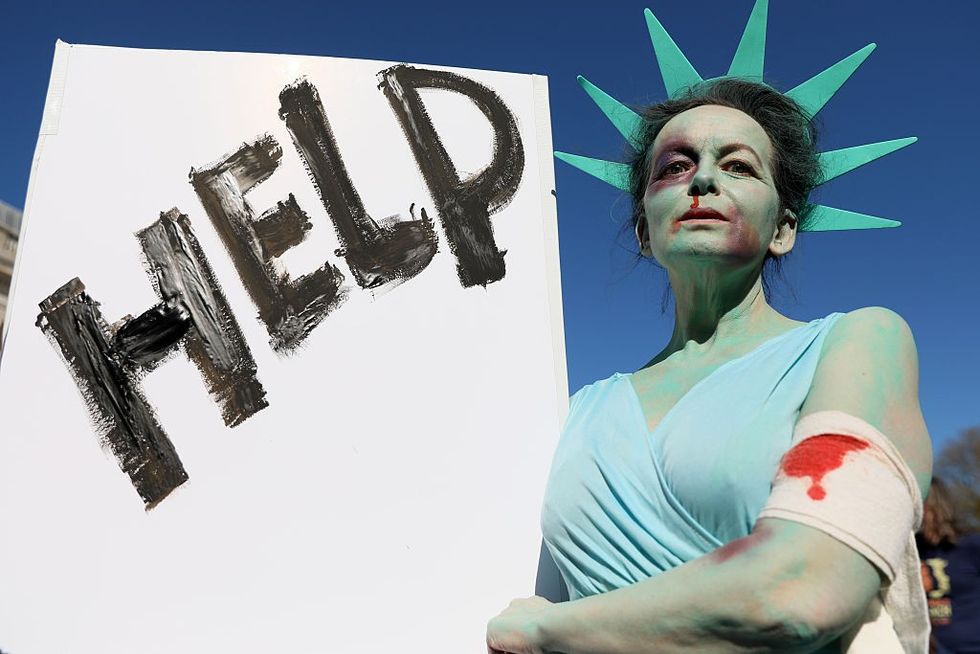
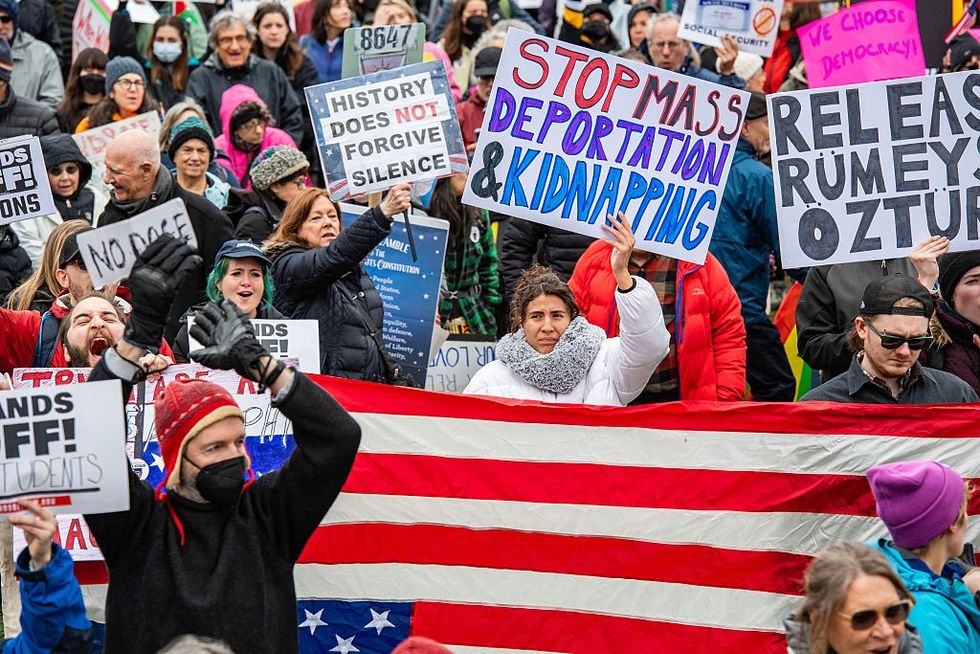
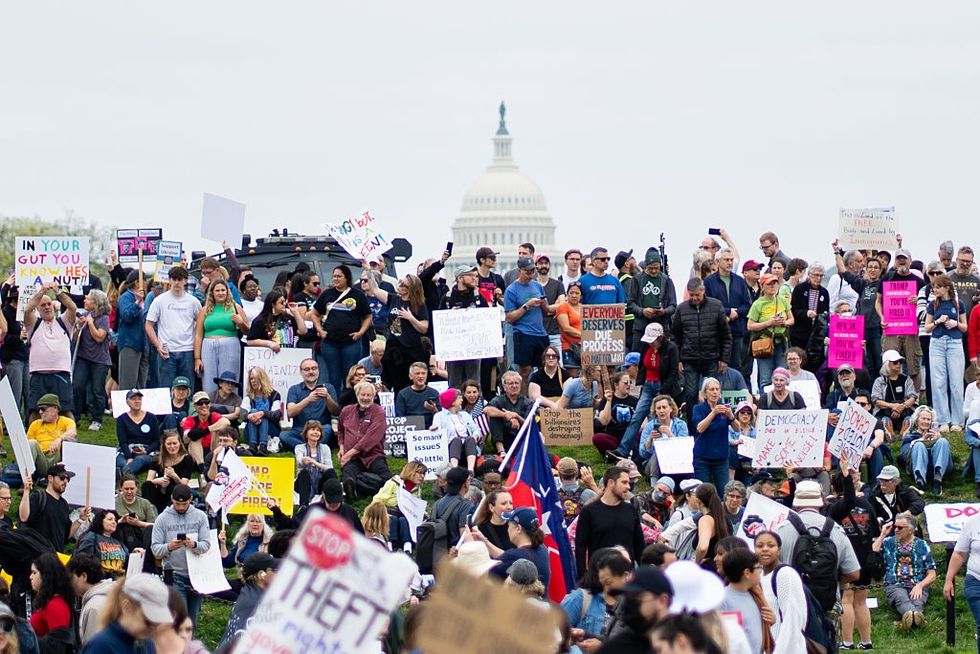
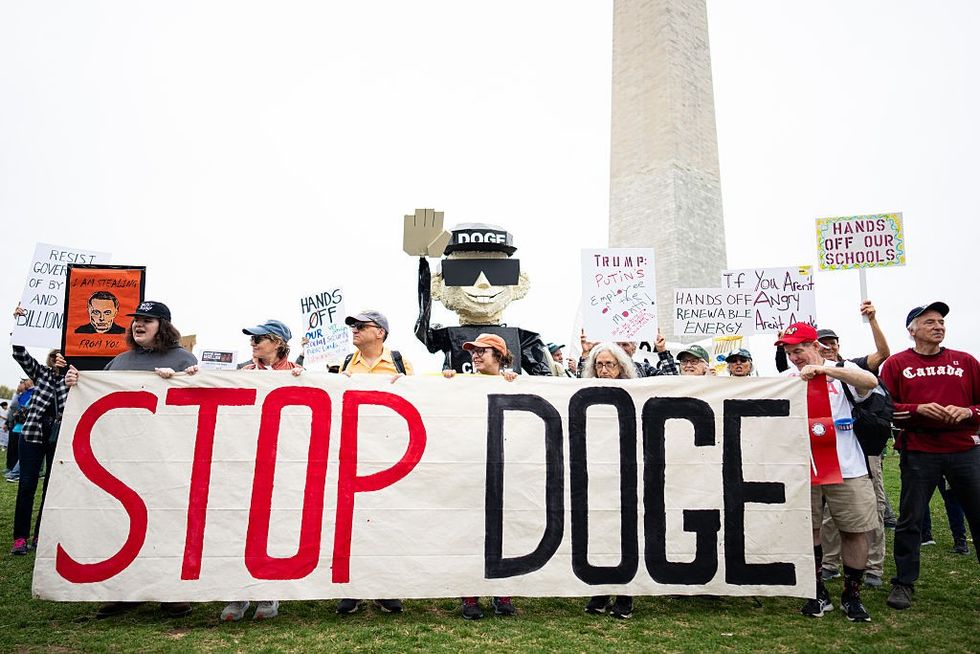
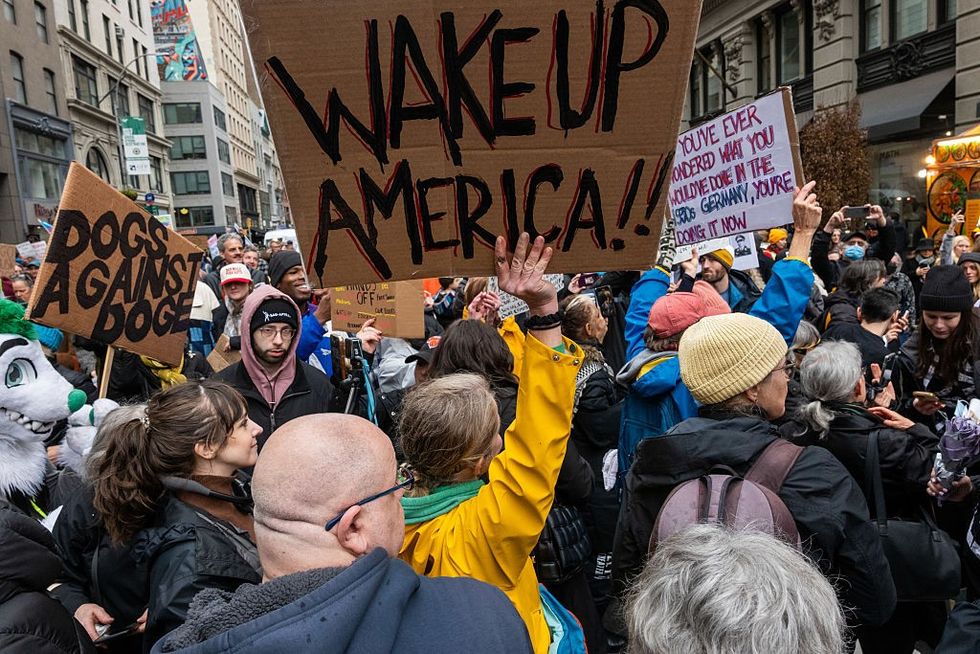
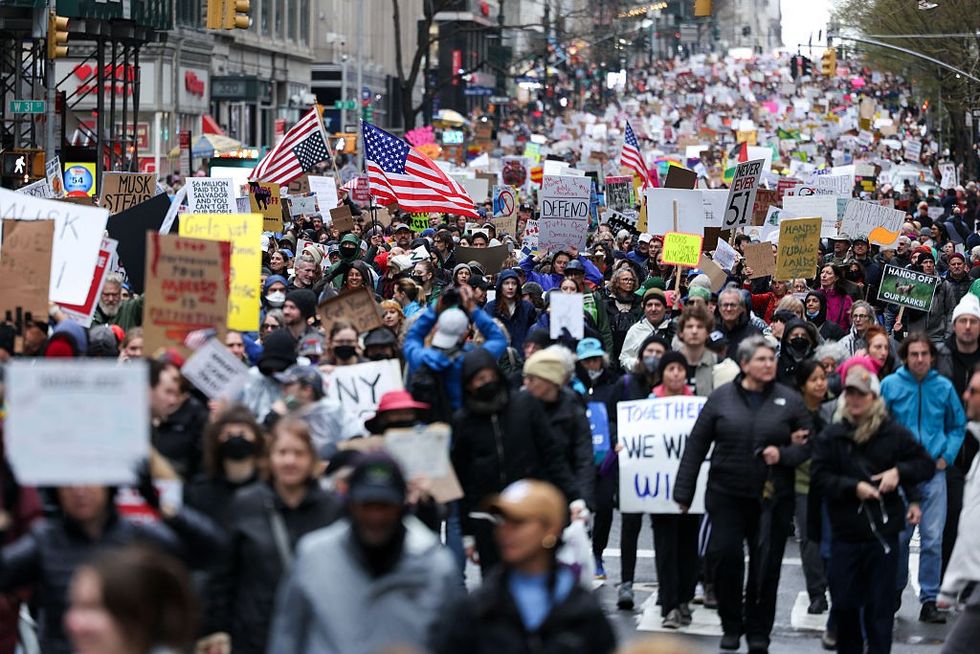
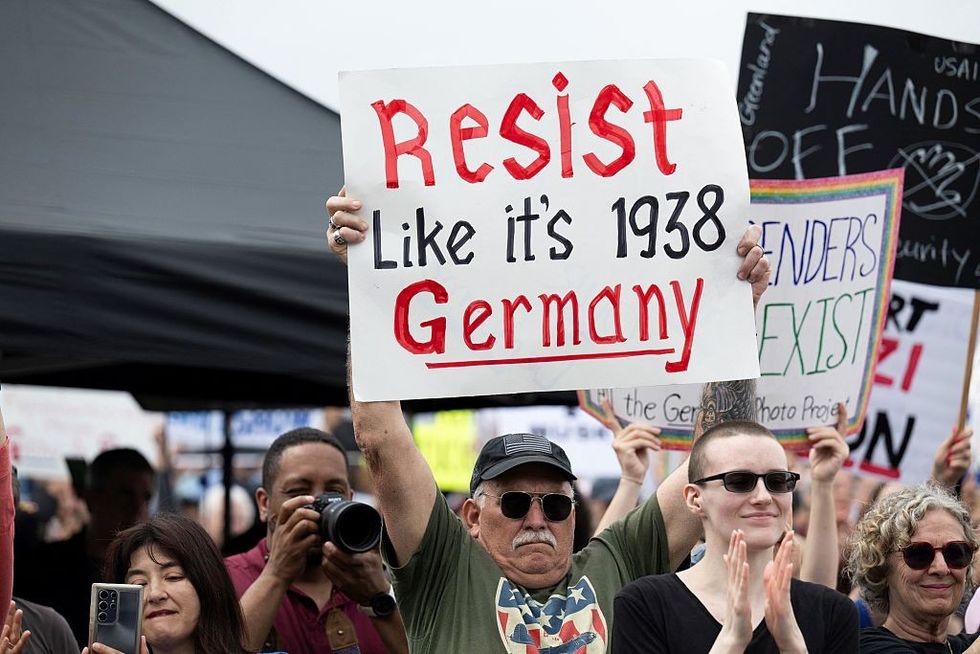
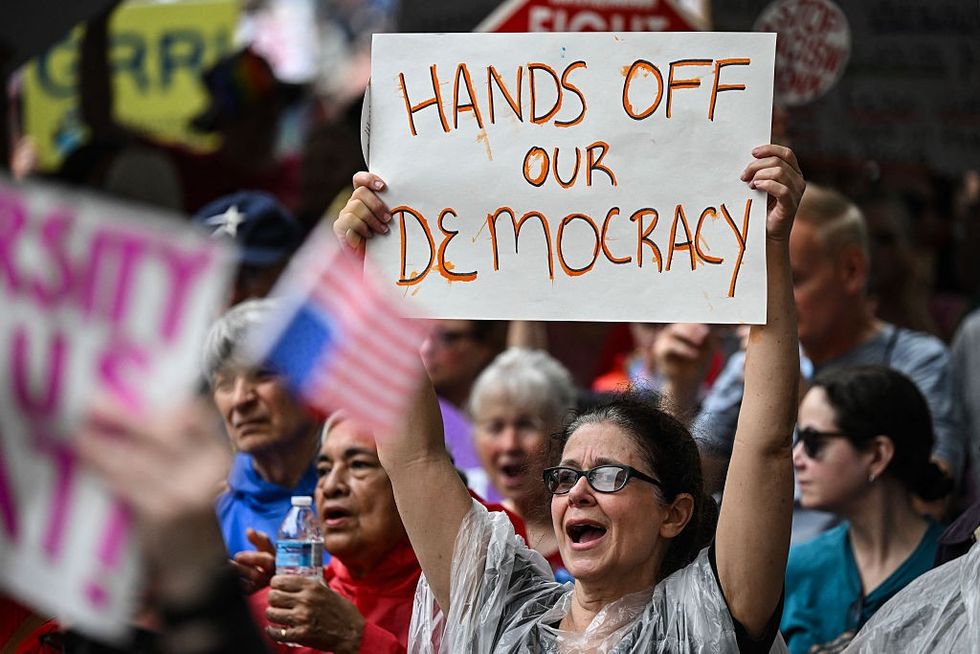
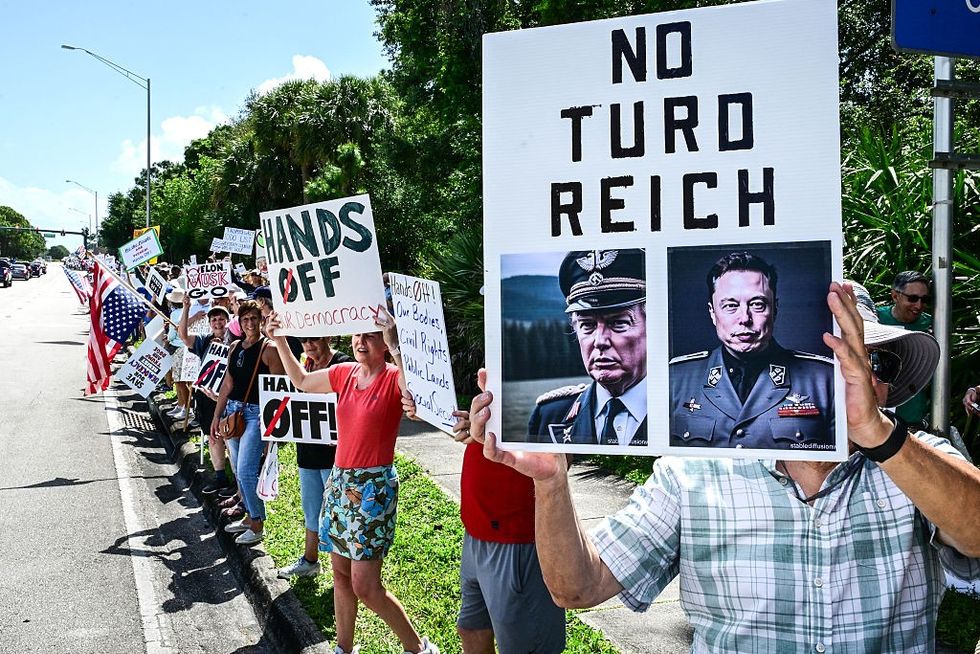
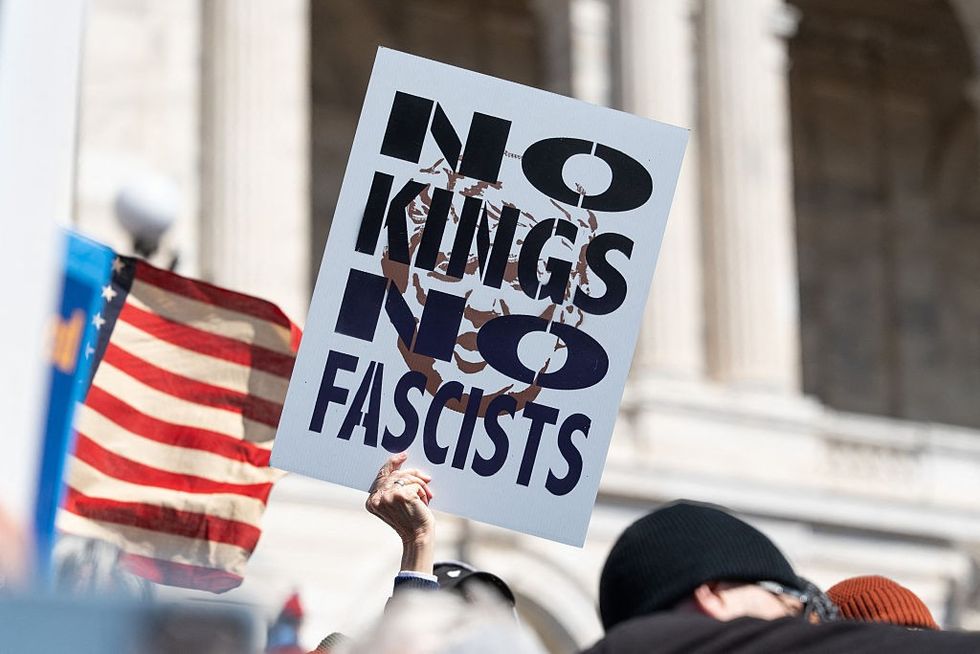
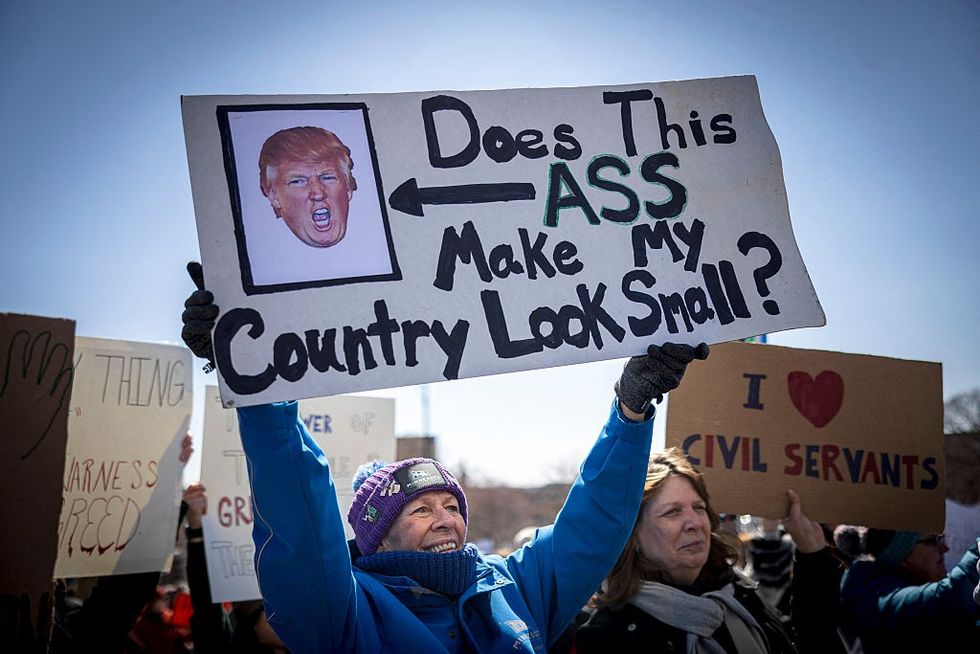
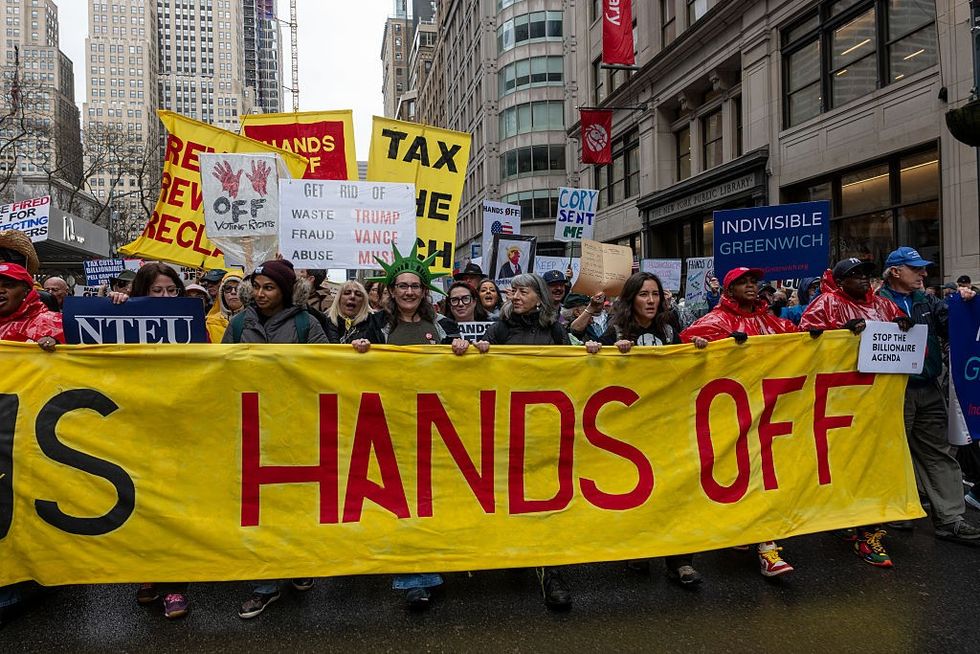
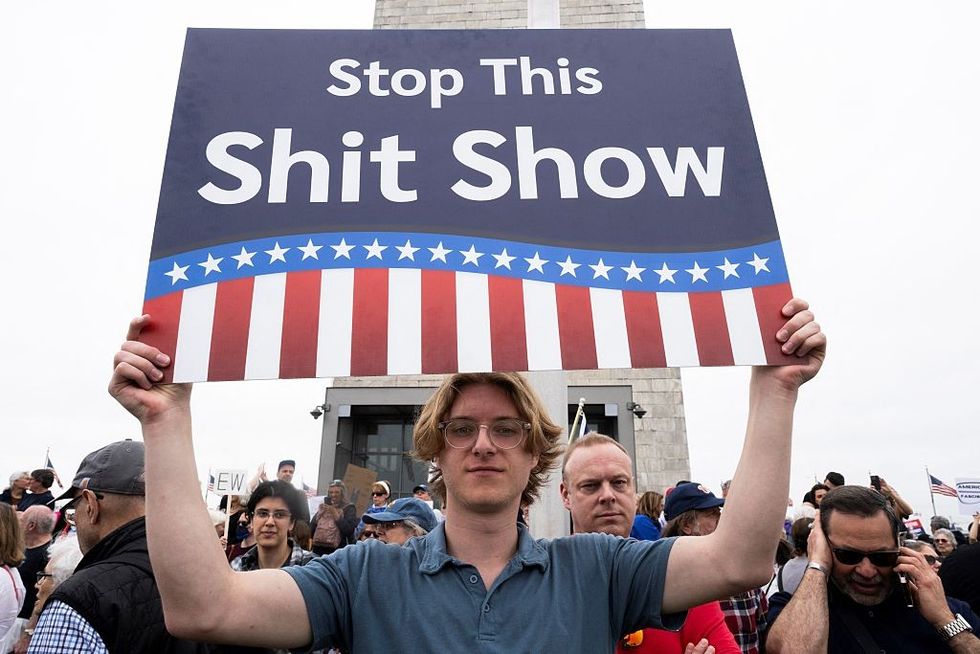
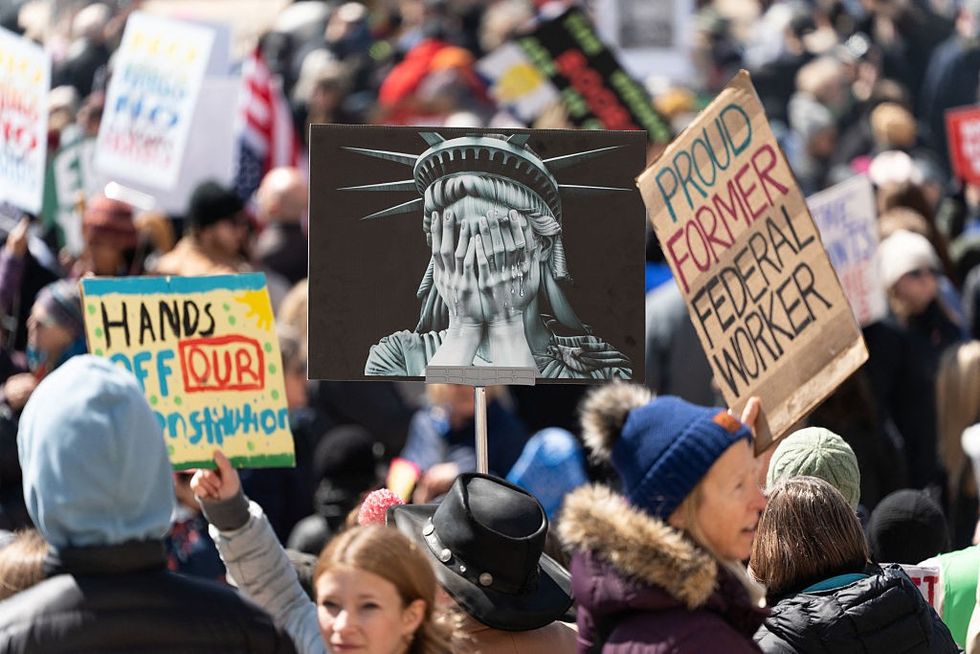
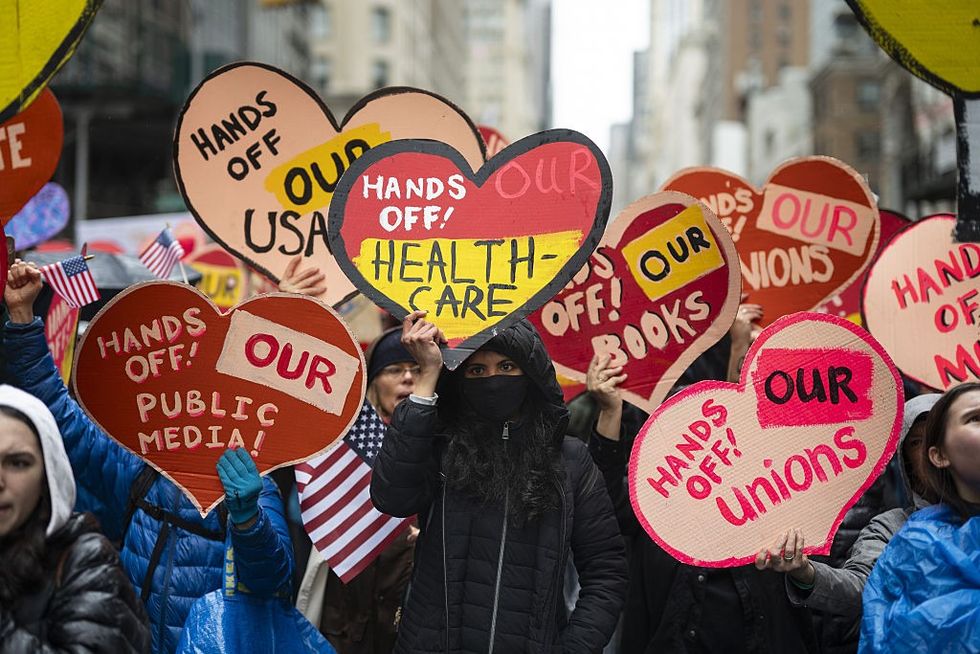
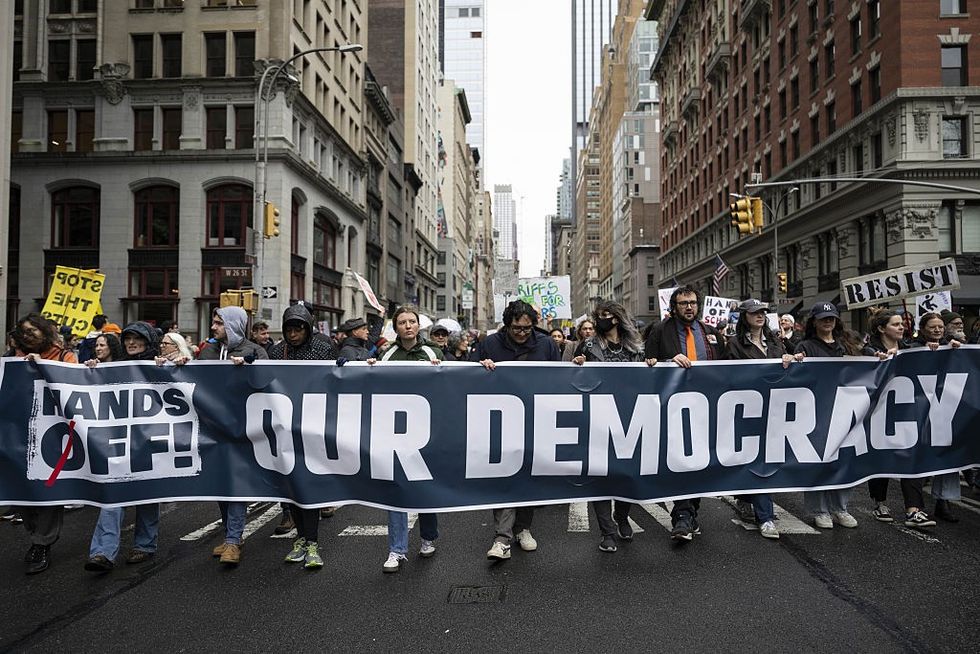
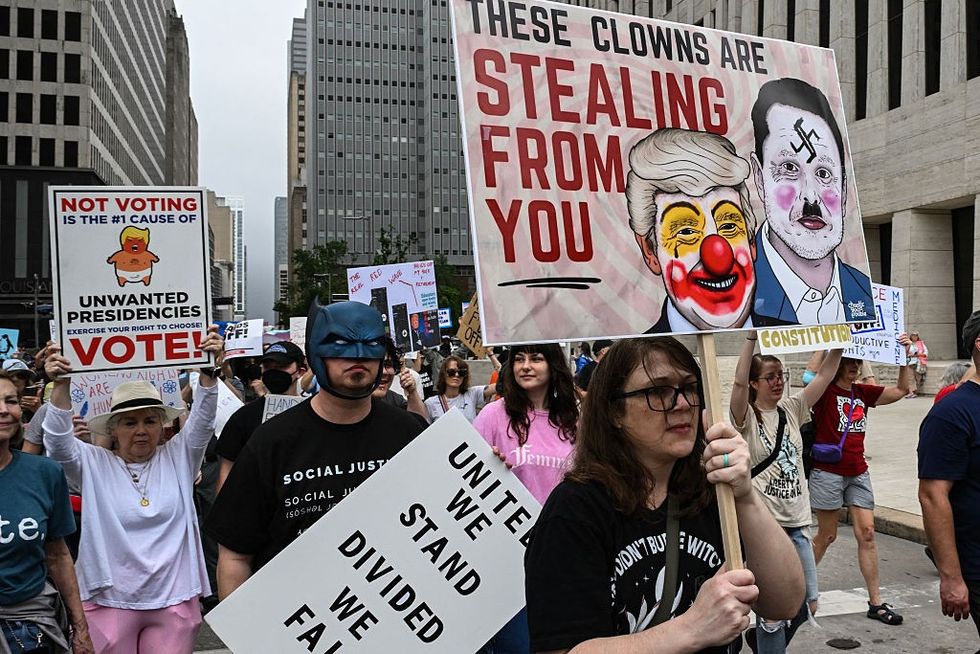
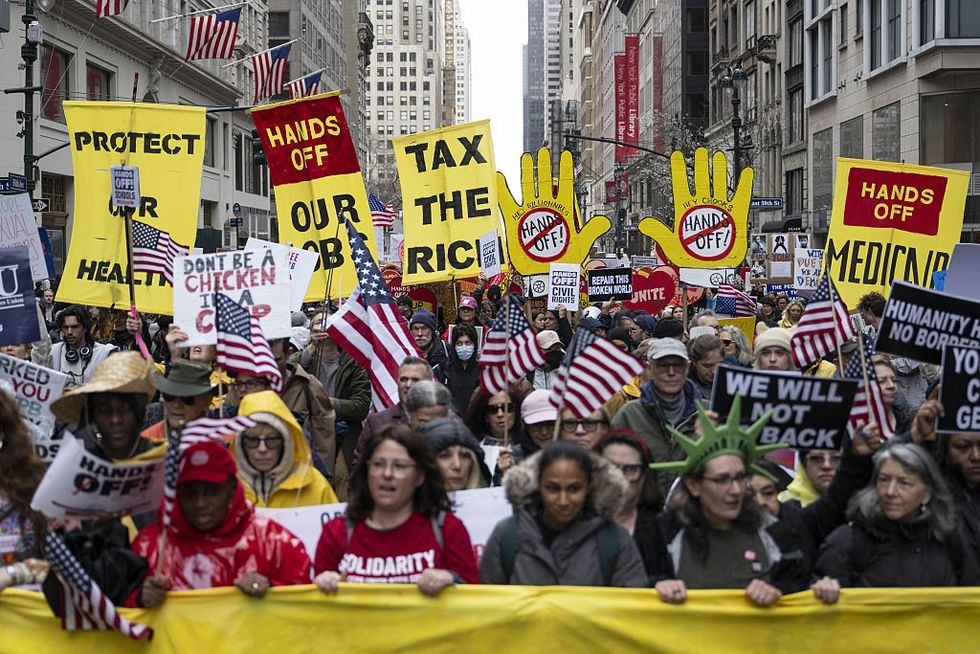
"Everyone involved in this crime against humanity, and everyone who covered it up, would face prosecution in a world that had any shred of dignity left."
A video presented to officials at the United Nations on Friday and first made public Saturday by the New York Times provides more evidence that the recent massacre of Palestinian medics in Gaza did not happen the way Israeli government claimed—the latest in a long line of deception when it comes to violence against civilians that have led to repeated accusations of war crimes.
The video, according to the Palestine Red Crescent Society (PRCS), was found on the phone of a paramedic found in a mass grave with a bullet in his head after being killed, along with seven other medics, by Israeli forces on March 23. The eight medics, buried in the shallow grave with the bodies riddled with bullets, were: Mustafa Khafaja, Ezz El-Din Shaat, Saleh Muammar, Refaat Radwan, Muhammad Bahloul, Ashraf Abu Libda, Muhammad Al-Hila, and Raed Al-Sharif. The video reportedly belonged to Radwan. A ninth medic, identified as Asaad Al-Nasasra, who was at the scene of the massacre, which took place near the southern city of Rafah, is still missing.
The PRCS said it presented the video—which refutes the explanation of the killings offered by Israeli officials—to members of the UN Security Council on Friday.
"They were killed in their uniforms. Driving their clearly marked vehicles. Wearing their gloves. On their way to save lives," Jonathan Whittall, head of the UN's humanitarian affairs office in Palestine, said last week after the bodies were discovered. Some of the victims, according to Gaza officials, were found with handcuffs still on them and appeared to have been shot in the head, execution-style.
The Israeli military initially said its soldiers "did not randomly attack" any ambulances, but rather claimed they fired on "terrorists" who approached them in "suspicious vehicles." Lt. Col. Nadav Shoshani, an IDF spokesperson, said the vehicles that the soldiers opened fire on were driving with their lights off and did not have clearance to be in the area. The video evidence directly contradicts the IDF's version of events.
As the Times reports:
The Times obtained the video from a senior diplomat at the United Nations who asked not to be identified to be able to share sensitive information.
The Times verified the location and timing of the video, which was taken in the southern city of Rafah early on March 23. Filmed from what appears to be the front interior of a moving vehicle, it shows a convoy of ambulances and a fire truck, clearly marked, with headlights and flashing lights turned on, driving south on a road to the north of Rafah in the early morning. The first rays of sun can be seen, and birds are chirping.
In an interview with Drop Site News published Friday, the only known paramedic to survive the attack, Munther Abed, explained that he and his colleagues "were directly and deliberately shot at" by the IDF. "The car is clearly marked with 'Palestinian Red Crescent Society 101.' The car's number was clear and the crews' uniform was clear, so why were we directly shot at? That is the question."
The video's release sparked fresh outrage and demands for accountability on Saturday.
"The IDF denied access to the site for days; they sent in diggers to cover up the massacre and intentionally lied about it," said podcast producer Hamza M. Syed in reaction to the new revelations. "The entire leadership of the Israeli army is implicated in this unconscionable war crime. And they must be prosecuted."
"Everyone involved in this crime against humanity, and everyone who covered it up, would face prosecution in a world that had any shred of dignity left," said journalist Ryan Grim of DropSite News.
"They're dismantling our country. They're looting our government. And they think we'll just watch."
In communities across the United States and also overseas, coordinated "Hands Off" protests are taking place far and wide Saturday in the largest public rebuke yet to President Donald Trump and top henchman Elon Musk's assault on the workings of the federal government and their program of economic sabotage that is sacrificing the needs of working families to authoritarianism and the greed of right-wing oligarchs.
According to the organizers' call to action:
They're dismantling our country. They’re looting our government. And they think we'll just watch.
On Saturday, April 5th, we rise up with one demand: Hands Off!
This is a nationwide mobilization to stop the most brazen power grab in modern history. Trump, Musk, and their billionaire cronies are orchestrating an all-out assault on our government, our economy, and our basic rights—enabled by Congress every step of the way. They want to strip America for parts—shuttering Social Security offices, firing essential workers, eliminating consumer protections, and gutting Medicaid—all to bankroll their billionaire tax scam.
They're handing over our tax dollars, our public services, and our democracy to the ultra-rich. If we don't fight now, there won’t be anything left to save.
More than 1,000 "Hands Off!" demonstrations—organized by a large coalition of unions, progressive advocacy groups, and pro-democracy watchdogs—first kicked off Saturday in European, followed by East Coast communities in the U.S., and were set to continue throughout the day at various times, depending on location. See here for a list of scheduled "Hands Off" events—or schedule one in your community.
"The United States has a president, not a king," said the progressive advocacy group People's Action, one of the group's involved in the actions, in an email to supporters on Saturday just as protest events kicked off in hundreds of cities and communities. "Donald Trump has, by every measure, been working to make himself a king. He has become unanswerable to the courts, Congress, and the American people."
Citing the Republican president's thirst for "power and greed," the group explained why organized pressure must be built and sustained against the administration, especially at the conclusion of a week in which the global economy was spun into disarray by Trump's tariff announcement, his attack on the rule of law continued, and the twice-elected president admitted he was "not joking" about the possibility of seeking a third term, which is barred by the constitution.
"He is destroying the economy with tariffs in order to pay for the tax cuts he wants to push through to enrich himself and his billionaire buddies," warned People's Action. "He has ordered the government to round up innocent people off of the streets and put them in detention centers without due process because they dared to speak out using their First Amendment rights. And he is not close to being done—by his own admission, he is planning to run for a third term, which the Constitution does not allow."
Live stream of Hands Off rally in Washington, D.C.:
Below are photo or video dispatches from demonstrations around the world on Saturday. Check back for updates...
United Kingdom
France
Germany
Belgium:
Massachusetts:
Maine:
Washington, D.C.:
New York:
Minnesota:
Michigan:
Ohio:
Colorado:
Pennsylvania:
North Carolina:
The protest organizers warn that what Trump and Musk are up to "is not just corruption" and "not just mismanagement," but something far more sinister.
"This is a hostile takeover," they said, but vowed to fight back. "This is the moment where we say NO. No more looting, no more stealing, no more billionaires raiding our government while working people struggle to survive."